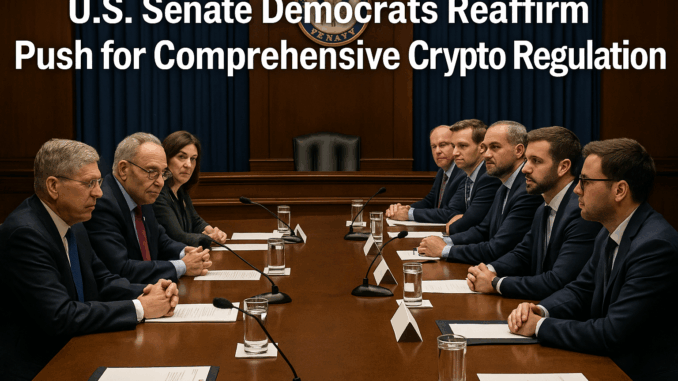
In a development closely watched by the digital-asset community, U.S. Senate Democrats have assured top cryptocurrency executives that Washington remains committed to advancing comprehensive crypto legislation — even as broader political distractions threaten to delay progress.
Renewed Commitment Amid Political Gridlock
The reassurance came during a closed-door policy discussion in Washington, D.C., on October 22, 2025, where several major crypto CEOs and policymakers exchanged views on digital-asset oversight, anti-money-laundering (AML) standards, and consumer protection frameworks. Despite mounting uncertainty caused by election-year politics and budget debates, lawmakers emphasized that crypto regulation remains a legislative priority.
According to multiple sources, senators from key committees reiterated that bipartisan cooperation is still possible on specific issues such as stablecoin oversight, exchange registration, and reporting requirements. The meeting underscored that, while political polarization persists, both parties now recognize the need for clarity in the fast-growing crypto sector.
A Balancing Act Between Innovation and Oversight
At the heart of the discussion was a fundamental question: how to foster innovation without compromising financial integrity. Lawmakers are seeking to modernize existing frameworks — particularly the Bank Secrecy Act (BSA) and the Commodity Exchange Act (CEA) — to address decentralized technologies, smart contracts, and tokenized assets.
Industry leaders welcomed the initiative but urged Congress to adopt a technology-neutral approach. They argued that excessive regulation could push innovation overseas, where friendlier jurisdictions like Singapore, the U.K., and the EU are already rolling out clearer crypto directives.
“The U.S. has the opportunity to lead global digital-asset innovation,” one executive commented after the meeting. “But that leadership depends on creating rules that encourage responsible participation — not punishment for experimentation.”
Stablecoins and Exchange Oversight Take Center Stage
The most urgent topic, according to insiders, was stablecoin regulation. As stablecoins like Tether’s USDT and Circle’s USDC reach hundreds of millions of users worldwide, concerns over reserves transparency, redemption guarantees, and systemic risk have drawn bipartisan attention. Lawmakers are reportedly finalizing a draft framework that would define stablecoin issuers as “qualified payment institutions” — subject to capital and disclosure standards similar to banks.
Another critical point of debate involved centralized exchange (CEX) registration with the Commodity Futures Trading Commission (CFTC) and Securities and Exchange Commission (SEC). The goal is to clarify whether exchanges trading spot crypto assets should be supervised under securities or commodities law, a distinction that has fueled years of jurisdictional friction between regulators.
Industry Response and Market Impact
The crypto market reacted cautiously but positively to the news. Bitcoin and Ethereum prices steadied after several days of declines, reflecting renewed optimism that U.S. policymakers may finally provide the clarity long sought by institutional investors.
Analysts note that regulatory certainty is a prerequisite for the next wave of institutional adoption — particularly as traditional finance giants like BlackRock and Fidelity continue to expand their crypto ETF portfolios.
“Every time Washington moves closer to a defined framework, it reduces risk premiums and improves capital inflows,” said a senior economist at a New York-based fintech research firm.
Looking Ahead: The Legislative Roadmap
While optimism is growing, challenges remain. With only a few months left in the legislative calendar, it’s unlikely that a comprehensive crypto bill will pass before 2026. Instead, observers expect incremental progress: updates to AML reporting, pilot licensing programs for stablecoin issuers, and collaborative CFTC-SEC guidance for exchanges.
Still, the tone from Capitol Hill signals an important shift — from skepticism to structured engagement. The conversation has evolved from whether crypto should be regulated, to how it should be regulated.
In summary:
The U.S. Senate’s renewed engagement reflects a maturing view of the digital-asset economy. For the first time, lawmakers, regulators, and industry leaders appear aligned on a shared goal — building a regulatory architecture that protects consumers, ensures financial stability, and positions America as a global leader in digital innovation.